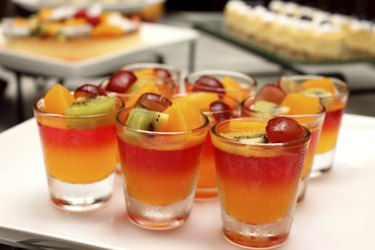
But is it kosher? That's not only a phrase used to question a dubious action but to verify that the food you are about to eat meets the dietary laws of Orthodox Jewry. But before we launch into a treatise on kosher food, let's rewind back to the origin of the Biblical definition of kosher as written in Leviticus 11 and Deuteronomy 17:
To make a difference between the unclean and the clean, and between the beast that may be eaten and the beast that may not be eaten.
Video of the Day
Video of the Day
The operative word here is "clean" and involves the process of cleansing, or purification of animals from slaughterhouse to table. To finish off the cleansing process, the food must be from an animal source that was blessed by a rabbi who certifies that the food satisfies the strict demands of kosher preparation. So, where does gelatin, a substance derived from the pig, come into the equation when pork isn't kosher?
The Bible further defines which meat is considered kosher and defines nonkosher animals:
Animals must chew their cud and have split hooves.
"Aha!" you say. Pigs have split hooves! But they also must chew their cud, which means pigs are not kosher. So, what's a kosher cook to do when making a Jell-O or an aspic or a panna cotta?
Think about fish
Fish is considered kosher if it has fins and scales and is processed correctly. That includes most fish swimming in worldwide waters but excludes shellfish. Tuna, salmon, halibut and mackerel are prominent kosher fish and are served at the table in many Jewish households, but not at the same time as meat. Jewish law dictates what kosher gelatin products to use. Kosher fish gelatin is derived from the skin of the fish or the scales, but the process requires precise timing, measurements and heat control.
Why are we obsessing over gelatin?
Gelatin has a unique property: collagen. It's what holds the liquid together as well as our skin when binding liquids. It is colorless and tasteless, and its functionality comes from the collagen derived from animal parts. You can find gelatin in leaf or powder form, with the gelatin powder being useful when making a cold dish. Gelatin is a natural source of protein and amino acids and is not chemically treated. It is also cholesterol-free, fat-free, sugar-free, almost calorie-free and gluten-free as it thickens, binds and gels. You may not have thought of this, but it's gelatin that binds the gel supplements, vitamins and pharmaceutical items in your medicine cabinet. It is one of the two most used hydrocolloids, or thickening or gelling agents, in the world.
Beauty experts like to extol the benefits of collagen peptides, as they fight skin wrinkles, arthritis pain, stiff joints and reduced muscle mass. And what are collagen peptides made from? Bovine connective tissue or fish, and since collagen and gelatin are derived from similar attributes, they must be classified as kosher or not. But what they are not is vegan or vegetarian.
But if gelatin isn’t kosher, what’s a kosher cook to do?
Plan B means finding a substitute for pig-derived gelatin and one that's approved by a kashrut agency, or the Orthodox Union or team of rabbis schooled in kosherizing food products. Kashrus gelatin substitutes are easily found on grocery shelves, and Orthodox Jews depend on them. Look for the word "pareve" to indicate if the product is kosher. Vegan gelatin that satisfies a vegetarian's diet also requires the unflavored vegan gelatin. If your gelatin dessert calls for ice cream, s'mores oozing with marshmallows or fruit molds, kosher tables appreciate the stabilizing influence of gelatin in whatever guise it uses.
You may find agar agar, a cooked and pressed seaweed, as an ingredient in a recipe. It congeals tighter than gelatin, so your Jell-O may not jiggle as much as the kids like. One teaspoon of agar agar is an equal measure of powdered or flaked agar, but the flakes must be dissolved before using them.
Still using the seaweed as a base for gelatin, carrageenan is another byproduct and substitute for gelatin. It sets softly, unlike agar. Use iota carrageenan for soft gelling and kappa carrageenan for a tighter gel depending on the thickness required for your puddings.
And vegan gel, consisting of vegetable gum and a load of ingredients we've probably never heard of, including adipic acid, tapioca dextrin, calcium phosphate and potassium citrate, is a third source of gelatin replacement. All of these can be considered kosher gelatin and can be used in a kosher kitchen.
Back to those rabbis
At one time, there were two main kosher certification agencies, but as the world has expanded and the need for kosher food has increased, more organizations are jumping on the bandwagon. Jewish kitchens aren't the only user of kosher food. Halal foods, those approved for ingestion by Muslims, are considered similar to kosher ingredients, and many Muslims accept the kosher-certified food as Halal.
When a food is indicated by a K surrounded by a circle, it means it's been certified by a rabbi, and the same goes for the OU symbol, meaning Orthodox Union. Today, there are many certification companies, and a symbol is placed on the packaging to indicate its worthiness as being kosher. Meat products are another subclassification and since the process is extremely involved, it is recommended that kosher meat be procured at a kosher butcher. Your package of gelatin should carry the kosher label if you are to be certain the product meets the specifications of what a kosher product should be.